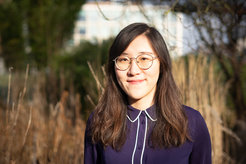"This is us" - Questions for Mengchen Dong
Our institute has over 300 employees. But that is just a number. Who are the people at our institute? What do they do and what drives them? In our "This is us" format, colleagues answer questions about their work and their motivation.

On the occasion of International Women's Day on March 8, 2023, we started the series “This is us” with 15 female scientists from our institute. We are picking up where we left off and introducing the scientist Mengchen Dong from the research area Humans and Machines. Helen Ahner from the research area History of Emotions kicked off the series.
One of your research topics at the center for humans and machines is the psychology of artificial intelligence in various applied contexts. What fascinates you about this topic?
I did my Ph.D. studying moral psychology and it always intrigues me how moral psychology theories and insights can illuminate applied societal issues. With the exponential rise of artificial intelligence and related ethical and governance controversies, I sincerely believe that I can contribute to the interdisciplinary research community and inform human-centered AI technologies with psychological research.
You currently examine AI ethics and governance issues. What different expectations where you able to see between different countries? For example, Germany and the USA or China?
Many local factors may influence cultural expectations about AI, including, for example, governmental policies and historical interactions with digitalization and intelligent machines. Related to these and other factors, in one project, we indeed found that people in Japan and China are more optimistic about AI taking over important human occupational roles (e.g., doctor, care worker, etc.), and it was less so in Germany and the United States. People in Japan and China are also more likely to see human-like psychological potentials from AI.
Where do you get your research ideas?
Discussions about AI ethics and governance span across academic and popular media outlets, and both are important sources for me and the researchers at CHM to generate important and meaningful research ideas. We also need to keep an eye on the latest AI innovations (e.g., ChatGPT), and hopefully test the human impacts of landmark AI products through a scientific approach.
What do you appreciate about the Max Planck Community?
What I have experienced is that we do not only care about adding new insights into specific theories or knowledge domains but also initiating impactful research that explores the unknown and inspires new discussions across different disciplines. I also highly appreciate the global vision of the Max Planck Community, which allows me to study topics that I can personally relate to as an international researcher.
